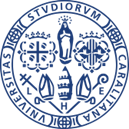Università degli Studi di Cagliari
Università degli Studi di Cagliari (UNICA)
The University of Cagliari (UNICA) is a public state University with about 25,000 students and over 1,900 teaching and technical administrative staff. It is located in the island of Sardinia (Italy) in the western Mediterranean. UNICA is a multidisciplinary university offering an interesting and complete education through 6 Faculties and 15 Departments.

The Department of Life and Environmental Science, Division of Animal Biology and Ecology is the hub for Marine Sciences at the University of Cagliari and has an outstanding reputation at national and international levels. Its mission is dedicated to achieving the University’s primary objectives: basic and applied research, teaching and the third mission, at the service of the innovation required by today’s knowledge society. The Department hosts the PhD programme ‘Life, Environmental and Drug Sciences’ with a curriculum dedicated to marine biology and ecology.
Research areas in marine science developed at UNICA cover basic and applied research in:
Zoology and Fishery Science, focusing on the studies of biology and management of halieutic resources. The research activity ranges from the functional morphology of otoliths, sclerochronology, and the evaluation of the reproductive potential of demersal species, to the study of demersal food networks.
Marine and Experimental Ecology. This research area focuses on fundamental biology and applied ecology, experimental ecology (field and mesocosm manipulation experiments) of marine key species, including experimental aquaculture of novel species (sea urchins and sea cucumbers). Marine ecosystems investigated are from transitional aquatic ecosystems to the oceans’ hadal depth. Studies focus on critical issues (coastal eutrophication, climate change, microplastic transfer through deep-sea food webs, and overfishing) and identify and promote aquatic species’ conservation, management, and recovery.
Molecular Zoology, to study different marine animal groups, using molecular tools (based on cytogenetic, genetics and genomic approaches) to understand the occurrence, distribution, connectivity, evolution, conservation, and sustainable management of marine taxa.
Comparative Anatomy, Histology and Cytology, topics on gametogenesis of marine invertebrates (crustaceans, cephalopods, corals, and echinoderms) and vertebrates (bony and cartilaginous fish), standard histology and histochemical methodologies, cito-histochemical using bright field and fluorescence microscopy.
DOWNLOAD HERE THE FULL PRESENTATION SHEET OF UNICA:
